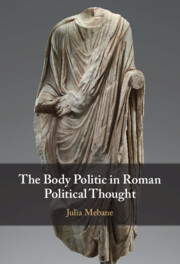Book contents
- The Body Politic in Roman Political Thought
- The Body Politic in Roman Political Thought
- Copyright page
- Dedication
- Contents
- Acknowledgments
- Introduction
- Chapter 1 The Divided Body Politic
- Chapter 2 The Sick Body Politic
- Chapter 3 The Augustan Transformation
- Chapter 4 Julio-Claudian Consensus and Civil War
- Chapter 5 Addressing Autocracy under Nero
- Conclusion
- Works Cited
- Index Locorum
- Index
Chapter 3 - The Augustan Transformation
Published online by Cambridge University Press: 01 February 2024
- The Body Politic in Roman Political Thought
- The Body Politic in Roman Political Thought
- Copyright page
- Dedication
- Contents
- Acknowledgments
- Introduction
- Chapter 1 The Divided Body Politic
- Chapter 2 The Sick Body Politic
- Chapter 3 The Augustan Transformation
- Chapter 4 Julio-Claudian Consensus and Civil War
- Chapter 5 Addressing Autocracy under Nero
- Conclusion
- Works Cited
- Index Locorum
- Index
Summary
Chapter 3 explores how the models of the healer and head of state converged around the figure of the princeps. Although each proved useful in validating the Principate, their distinctive Republican histories invested them with divergent imperial trajectories. Because Cicero had already integrated the figure of the healer into Republican discourse, Augustan writers could soon locate the princeps in this role as well. The regal resonance of the caput, in contrast, made it unavailable as a descriptor of the “first citizen.” It is therefore absent in the works of Vergil, Horace, and Propertius. Yet for a society steeped in organic comparisons and confronted with constitutional change, the utility of the metaphor was obvious. Livy responded to this quandary in his first pentad, which depicts three stages in the life cycle of the Roman body politic: a regal polity topped by a caput, a Republic structured around the Fable of the Belly, and a fusion of these two forms under Camillus. Livy’s narrative thereby helped make the head of state metaphor available for contemporary usage. As Augustus’ rule came to an end, Ovid finally began identifying him as the caput orbis.
Keywords
- Type
- Chapter
- Information
- The Body Politic in Roman Political Thought , pp. 95 - 130Publisher: Cambridge University PressPrint publication year: 2024

